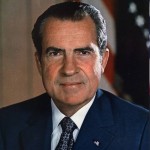On Monday night, after Trump fired acting Attorney General Sally Yates over her refusal to defend Trump’s Muslim ban, many commentators compared the incident to the infamous Saturday Night Massacre in 1973, when then-Attorney General Elliot Richardson and his deputy resigned after President Richard Nixon ordered Richardson to fire the special prosecutor investigating the Watergate scandal.
For more, two women who played key roles during the Nixon years offer their thoughts. Elizabeth Holtzman is a former U.S. congresswoman from New York who served on the House Judiciary Committee that voted to impeach Richard Nixon. Jill Wine-Banks was an assistant Watergate special prosecutor and the first woman to serve as U.S. Army general counsel.
Also on today’s show:
Former Watergate Prosecutor: We Need Officials Who Will Stand Up to Trump
More than 100 employees of the State Department have signed on to drafts of a dissent memo that condemns Trump’s executive order. One draft of the memo reads, “This ban stands in opposition to the core American and constitutional values that we, as federal employees, took an oath to uphold… We have a special obligation to maintain an immigration system that is as free as possible from discrimination, that does not have an implied or actual religious tests, and that views individuals as individuals, not as part of stereotyped groups.” As news of the dissent memo broke Monday, White House Press Secretary Sean Spicer threatened State Department officials, saying they should quit their jobs if they have a problem with Trump’s “program.”
Sarsour v. Trump: Palestinian-American Activist Sues the President to Overturn Muslim Ban
We turn now to Sarsour v. Trump—a sweeping lawsuit the Council on American-Islamic Relations filed Monday challenging Trump’s executive order temporarily banning all refugees from entering the United States and banning entry into the U.S. to all 218 million citizens from seven Muslim-majority nations: Iran, Iraq, Libya, Somalia, Sudan, Syria and Yemen. The lawsuit calls Trump’s ban a “Muslim Exclusion Order.” It argues the executive order is unconstitutional and violates the First Amendment’s religious freedom protections and the Fifth Amendment’s guarantee of equal protection. Palestinian-American activist Linda Sarsour, who was also co-chair of the Women’s March on Washington, discusses the lawsuit.
Trita Parsi: If Ban is How Trump Approaches Iran, We Fear Nuclear Deal Won’t Withstand Tensions
On Friday, Donald Trump signed an executive order temporarily banning all refugees from entering the country, and barring access for 90 days to nationals from seven majority-Muslim nations. The draconian measure instantly cut off access to the U.S. to 218 million people from Iran, Iraq, Libya, Somalia, Sudan, Syria and Yemen. Trita Parsi of the National Iranian American Council gives his views.

